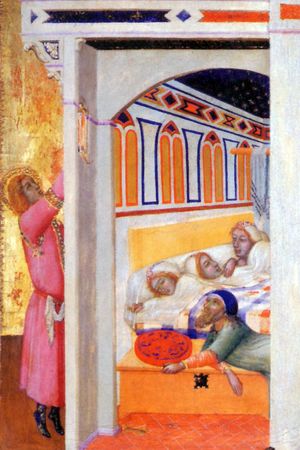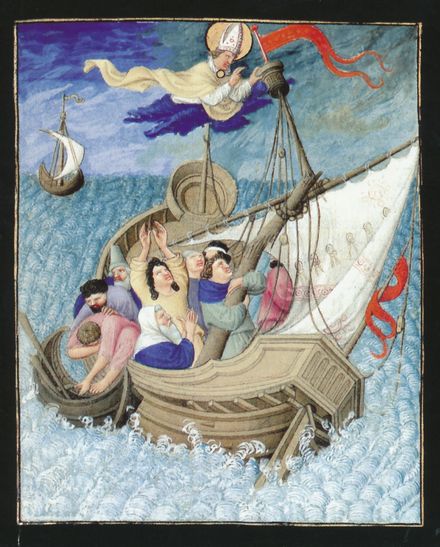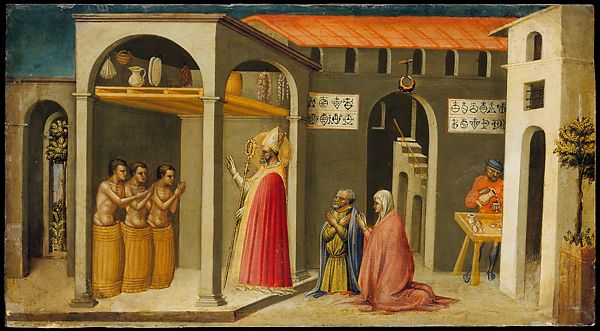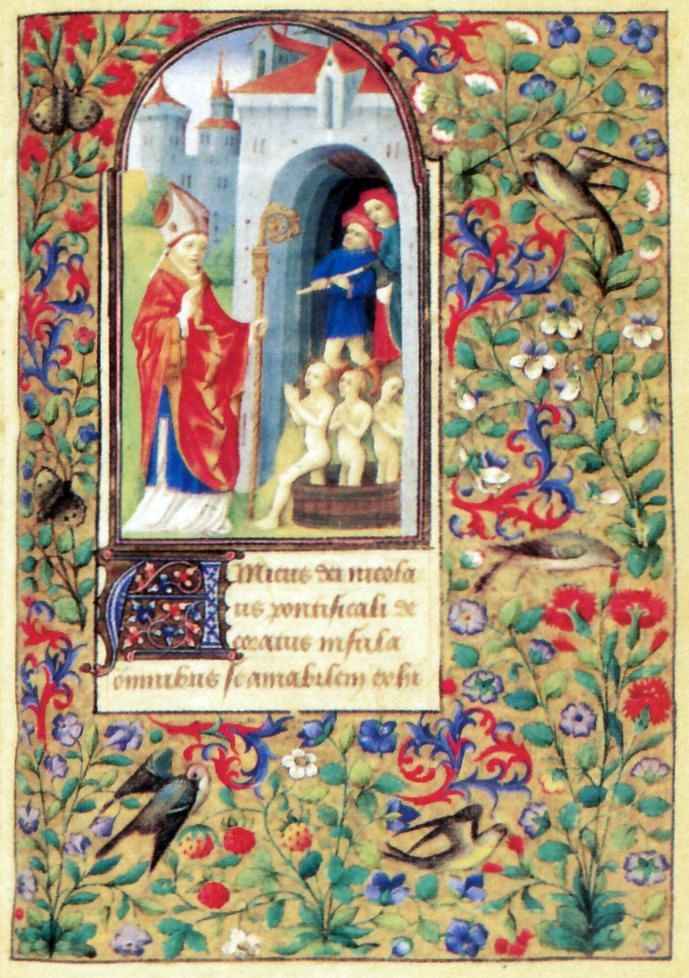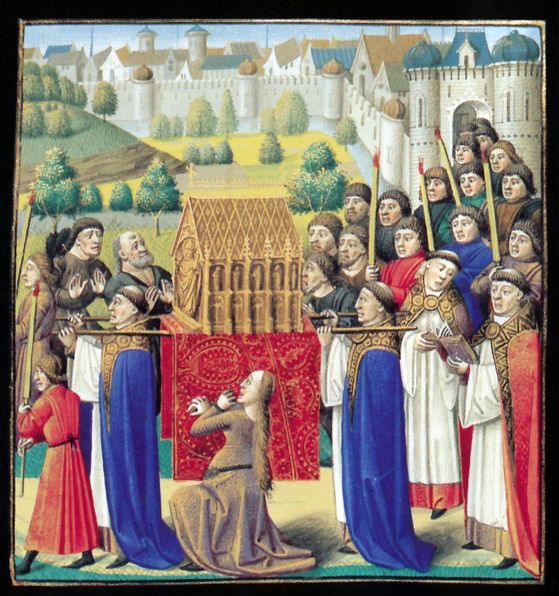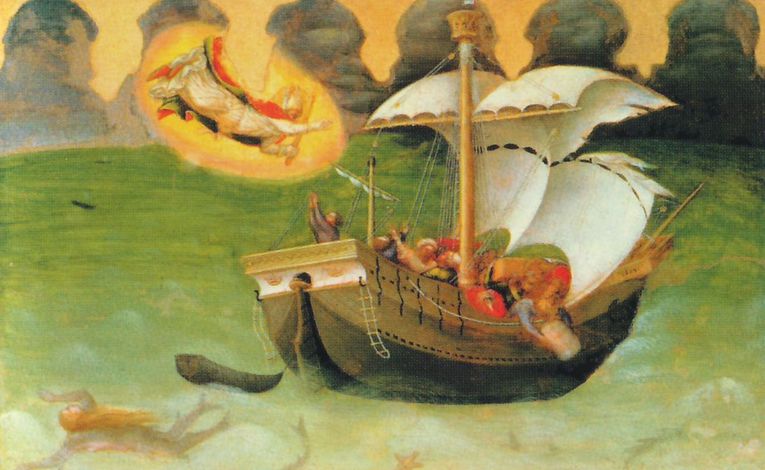Procursus
The Golden Legend (Legenda Aurea), by Jacobus de Voragine (1228-1298), is a large and pious compilation of the lives and miracles of Jesus, Mary, and countless saints.
The work attracted an enormous Medieval readership and was translated into many European languages. Thus it came to provide the definitive version of the miracle tales so beloved of Medieval Christendom.
Although miracles are recounted in association with the lives of these people, post-mortal miracles also interested the Medieval reader. That is not surprising, for the continuing presence of the long-dead saints of ages past is a comforting potential source of supernatural assistance in times of trouble.
With the rise of more critical historical thinking in the Renaissance, the wondrous tales of The Golden Legend fell into decline. (For a Nicholas-centered religious site with much additional information, click here.)
A 1483 English version of The Golden Legend by William Caxton became one of the first books printed in English (and is now available, of course, in an abbreviated version on the Internet, in quaint but copyright-free English).
The present English translation of the tale of Saint Nicholas was done by me as a Christmas holiday project in 2004.
De Voragine’s Latin was not particularly elegant, and in places it was not even very clear. The Latin text here is based on the 1890 edition of Legenda Aurea by Th. Graesse. I have felt free to repunctuate it, to follow alternative readings mentioned in Graesse’s footnotes, or occasionally to correct obvious errors. Teachers should feel free to use the Latin version or my translation without further permission.
—DKJ
| Nicolaus dicitur a nicos, quod est victoria, et laos, quod est populus, |
The name “Nicholas” is said to come from nicos, which means “victory,” and laos, “people.” |
| id est Nicolaus, quasi victoria populi, i.e., vitiorum quae et popularia et vilia sunt; |
Hence, Nicholas is as the “victory of the people,” i.e., victory over the sins which are among the people. |
| vel victoria proprie, quia multos populos vita et doctrina docuit vitia et peccata vincere. |
Or it means the victory of the people in the sense that by his life and his teachings he taught many peoples how to conquer vices and sins by his doctrines. |
| Vel Nicolaus dicitur a nicos, quod est victoria et laus, quasi victoriosa laus; |
Or it comes from nicos, “victory” and laus, “praise,” so “victorious praise.” |
| vel a nitor et laos, quod est populus, quasi nitor populi. |
Or from nitor “brilliance” and laos, so “brilliance of the people.” |
| Habuit enim in se ea, quae nitorem et munditiam faciunt. |
for he had in him those traits that make things bright and clean. |
| Nam secundum Ambrosium mundat sermo divinus, mundat vera confessio, mundat sancta cogitatio, mundat bona operatio. |
For according to Saint Ambrose, the divine word is cleansing; confession is cleansing, contemplation is cleansing; and good works are cleansing. |
| Eius legendam doctores Argolici conscripserunt. |
His life was written by learned men of Argos. |
| Est autem Argos secundum Isidorum civitas Graeciae, unde Argolici Graeci vocantur. |
Argos, according to Isidore, was a town in Greece, from which comes the name “Argolics” to mean Greeks.. |
| Alilbi ququoque legitur, quod Methodius patriarcha eam Graece conscripsit, quam Iohannes diaconus in latinum transtulit et plura addidit. |
Others say that Methodius, the patriarch, wrote it in Greek, and that John the Deacon translated it into Latin and added many things.. |
| Nicolaus civis Paterae urbis ex divitibus et sanctis parentibus originem duxit. |
Nicholas, a citizen of the town of Patras, was born to rich and pious parents. |
| Pater eius Epiphanes, mater vero Iohanna dicta est. |
His father was Epiphanes, and his mother Joanna. |
| Quem cum primaevo iuventutis suae flore parentes genuissent, deinceps caelibem vitam duxerunt. |
He was conceived in the first flower of their youth, and thereafter they led a life of continence. |
| Hic prima die, dum balnearetur, erectus stetit in pelvi. |
On the first day as he was being bathed, he stood up in the basin. |
| Insuper quarta et sexta feria tantum semel sugebat ubera. |
He would accept the breast only once on Wednesday and on Friday. |
| Factus autem iuvenis aliorum devitans lascivias ecclesiarum potius terebat limina et quidquid ibi de sacra scriptura intellegere poterat, memoriter retinebat. |
When he was young, avoiding the wantonness of the others, he visited churches and remembered all the selections form holy scripture that he was able to understand there. |
| Parentibus vero suis defunctis cogitare coepit, qualiter tantam divitiarum copiam non ad laudem humanam, sed ad Dei gloriam dispensaret. |
After his parents died, he began to consider how to distribute his wealth, not to gain the praise of men, but for the glory of God. |
| Tunc quidam contermineus suus satis nobilis tres filias ob inopiam prostituere cogitur, ut sic infami earum commercio aleretur. |
Now it happened that his neighbor, of noble birth but fallen into poverty, had three daughters whom he thought to prostitute that he might survive from their shameful commerce. |
| Quod ubi sanctus comperit, scelus abhorruit et massam auri panno involutam in domum eius per fenestram nocte clam iecit et clam recessit. |
When the saint learned of this, he was horrified by the crime; he wrapped up a lump of gold and secretly tossed through the window during the night, and fled unseen. |
| Mane autem surgens homo massam auri reperit et Deo gratiam agens primogenitae nuptias celebravit. |
When the man got up the next morning, he found the lump of gold. And, giving thanks to God, he celebrated the marriage of his oldest daughter. |
| Non multo post tempore Dei famulus simile peregit opus. |
Not long after this, the servant of God performed a similar deed. |
| Quod rursus ille reperiens et in laudes immensas prorumpens de caetero vigilare proposuit, ut sciret, quis esset, qui suae inopiae subvenisset. |
The man found it, and praised god mightily, planning to keep watch to discover who it was who saved him from his helplessness. |
| Post paucos etiam dies duplicatam auri massam in dornum proiecit, ad cuius sonitum ille excitatur et Nicolaum fugientem insequitur talique voce alloquitur: |
A few days later, he threw in twice as much gold, and the sound as it fell awakened the man. He followed the fleeing Nicholas, and said to him: |
| “Siste gradum teque aspectui ne subtrahas meo.” |
“Stop! Let me see you! Don’t run from me!´ |
| Sicque accurrens velocius Nicolaum hunc esse cognovit. |
Running faster, he recognized Nicholas |
| Mox humi prostratus osculari volebat pedes eius, quod ille refutans ab eo exegit, ne eum, quamdiu viveret, publicaret. |
Immediately kneeling down, he wanted to kiss Nicholas’ feet. But Nicholas, refusing this, extracted the promise that he would not reveal this as long as he lived. |
| Post hoc Myreae civitatis defuncto episcopo convenerunt episcopi, illi ecclesiae de episcopo provisuri. |
After this, the bishop of Myra died, and the bishops convened to select a new bishop. |
| Aderat autem inter eos quidam magnae auctoritatis episcopus, ad cuius electionem omnium sententia dependebat. |
There came one among them, a bishop of great authority, on whose opinion the views of all depended. |
| Cum igitur cunctos ieiuniis et orationibus insistere monuisset, nocte illa vocem audivit dicentem sibi, ut hora matutina fores ecclesiae observaret et, quem primum ad ecclesiam, cuius etiam nomen esset Nicolaus, venire conspiceret, ipsum in episcopum consecraret. |
After he had admonished them all to fast and pray, he heard a voce in the night, which said that in the morning he should observe the door of the church, and should consecrate as bishop the first to enter by the name of Nicholas. |
| Hoc ergo aliis revelans episcopis admonuit, ut omnes orationibus insisterent et ipse pro foribus excubaret. |
Revealing this to the other bishops, he urged them to be diligent in their prayers, and he himself kept watch at the doors. |
| Mirum in modum in hora matutinali quasi a Deo missus ante omnes se agebat Nicolaus, quem apprehendens episcopus dixit ei: |
Miraculously, early in the morning, as though sent by god, Nicholas came before the others, and the bishop approached him and said: |
| “Quod tibi nomen est!” |
“What is your name?” |
| Ille ut erat columbina simplicitate plenus, inclinato capite: “Nicolaus”, inquit, “vestrae sanctitatis servus.” |
As full of simplicity as a dove, and with his head slightly bowed, he replied, “Nicholas, your holiness’ servant.” |
| Quem in ecclesiam ducentes licet plurimum renitentem in cathedram collocarunt. |
And they led him into the church and seated him in the throne, though he resisted. |
| Ipse autem eandem quam prius humilitatem et morum gravitatem in omnibus sectabatur, |
And he acted in all things with the same humility and gravity of manner as he had shown before. |
| in oratiane pervigilabat, corpus macerabat, mulierum consortia fugiebat, |
He prayed through the night, mortified his body, and avoided the company of women. |
| humilis erat in omnes suspiciendo, efficax in loquendo, alacer in exhortando, severus in corripiendo. |
He was humble in respecting others; he was effective in speech, animated in giving advice, severe in correcting errors. |
| Fertur quoque sicut legitur in chronica quadam Nicolaum Nicaeno interfuisse concilio. |
It is also stated in a chronicle that Nicholas participated in the Council of Nicaea. |
| Quodam tempore totam provinciam Sancti Nicolai fames valida perculit, ita ut omnibus deficerent alimenta. |
Once the whole of Saint Nicholas’ province suffered a great famine, and on-one had any food. |
| Audiens autem vir Dei naves onustas tritico portui applicasse, illuc statim proficiscitur rogans nautas, ut saltem in centum modiis per quamlibet navem fame periclitantibus subvenirent. |
The man of God, hearing that ships loaded with wheat had arrived in the harbor, headed there immediately, begging the sailors to rescue the suffering with at least a hundred pecks of wheat per ship |
| Cui illi: “Non audemus, pater, quia mensuratum est Alexandriae, oportet in horrea imperatoris nos reddere.” |
They replied, “We don’t dare, Father, since it was measured at Alexandria, and we must deliver it intact to the imperial granary.” |
| Quibus Sanctus dixit: |
The saint said to them: |
| “Facite nunc, quod dico, et vobis in Dei virtute promitto, quod nullam minorationem habebitis apud regium exactorem.” |
“Do what I say, and I promise you in God’s name, that you will have not a bit less at the imperial inspection.” |
| Quod cum fecissent, et eandem mensuram, quam Alexandriae acceperant, reddidissent ministris imperatoris, |
And although they did this, they delivered to the imperial authorities the same amount that they had taken aboard in Alexandria. |
| miraculum referunt et Deum in suo famulo magnifica laude attollunt. |
They reported the miracle and greatly praised God through his servant. |
| Frumentum autem secundum uniuscuiusque indigentiam vir Dei distribuit, ita ut miraculose duobus annis non tantum ad victum sufficeret, sed etiam ad usum seminis abundaret. |
Meanwhile the man of God distributed the grain to each inhabitant according to his need, and he did it such that, miraculously, there was not only enough for two years of provisions, but even enough for use as seed. |
| Cum autem regio illa idolis deservisset, prae caeteris nefandae Dianae simulacrum populus coluerat adeo, ut usque ad tempus viri Dei nonnulli rustici praedictae religioni exsecrabili deservirent ac sub quadam arbore consecrata Dianae quosdam ritus gentilium exercerent. |
In this area people had worshipped idols, and had kept an image of the abominable Diana, so at the time of the man of God some peasants offered traditional rites before a tree consecrated to Diana. |
| Ac vir Dei praedictum ritum de omnibus finibus expulit ipsamque arborem praecidi mandavit. |
But the man of God warned that there must be an end to all of this, and he ordered that the tree be cut down. |
| Iratus ex hoc contra eum hostis antiquus oleum Mydyatum, quod contra naturam in aqua et lapidibus ardet, confecit. |
Angered by this, the Ancient Enemy created an oil which could burn unnaturally in water or stones. |
| Seque in formam religiosae feminae transfigurans quibusdam ad virum Dei navigantibus in quadam saginula obviavit. Sicque affata est eos: |
And transforming himself into the form of a nun, he set out in a little boat and met some pilgrims who were sailing to the man of God. And he said to them: |
| “Mallem ad Sanctum Dei venire vobiscum, sed nequeo. Rogo ergo vos, ut hoc oleum ad eius ecclesiam offeratis et ob mei memoriam exinde aulae eius parietes liniatis.” |
“I would like to go with you to this holy man of God, but I cannot. So I beg you to offer this oil to his church in remembrance of me, and spread it on the walls of the hall. |
| Et statim evanuit. |
And suddenly he was gone. |
| Et ecce aliam cernunt naviculam cum honestis personis, inter quos erat simillimus sancto Nicolao, qui sic ait illis: |
And then they saw another boat, with honest people aboard, including one who looked very like Nicholas and who spoke to them: |
| “Heu quid mulier illa locuta est vobis vel quid attulit!” |
“What did that woman tell you, and what did she bring?” |
| Illi autem cuncta per ordinem narraverunt. |
And one after the other they told him. |
| Quibus ille: |
He said to them: |
| “Haec est impudica Diana, et ut me verum dicere comprobetis, oleum illud in mare proicite.” |
This is the shameless Diana. And so that you can prove that what I say is so, pour the oil into the sea. |
| Quibus proiicientibus, ingens ignis in mari succenditur et contra naturam diutius in mari ardens conspicitur. |
Once they had thrown it, a great fire ignited on the sea, and they saw it burn violently for a long time all against nature on the sea. |
| Venientes igitur ad servum Dei aiebant: |
When they reached the servant of God, they said: |
| “Vere tu es ille, qui nobis in mari apparuisti et a diaboli insidiis liberasti” . |
“Why, you are the one who appeared to us at sea and saved us from the treachery of the devil!” |
| Per idem tempus cum quaedam gens Romano imperio rebellasset, contra eam intperator tres principes Nepotianum, Ursum et Apilionem misit, quos portui Adriatico ob ventum contrarium applieatos beatus Nicolaus ut secum comederent, invitavit, volens ut gentem suam a rapinis compescerent, quas in nundinis exercebant. |
When a certain people rebelled against Roman rule, the emperor sent against them three princes, named Nepotian, Ursus, and Apilion, who where hindered by a headwind on the Adriatic and stopped at the port, and the blessed Nicholas invited them to dine with him in order to avoid having his people set upon by them |
| Interim dum Sanctus abesset consul corruptus pecunia tres innocentes milites iussit decollari |
But while the saint was away, a consul, corrupted by money, commanded that three innocent knights be beheaded. |
| Quod ut vir sanctus audivit, rogavit principes illos, ut secum illuc usque gradu concito properarent, |
When the saint heard this, he asked the princes to hurry with him to the place. |
| veniensque ad locum, ubi de collandi erant, invenit eos, poplite flexo et facie iam velata et spiculatorem ensem super eorum capita iam vibrasse. |
Coming to the place where they were to be beheaded, he found them kneeling and blindfolded, and the executioner was brandishing the sword over their heads |
| At Nicolaus zelo accensus et in lictorem se audacter ingessit et gladium de eius manu eminus propulit innocentesque solvens eos incolumes secum duxit. |
Nicholas, seized with zeal, threw himself upon the executioner, pulled the sword from his hand, and, releasing the innocent men, led them away safe and sound. |
| Illico ad praetorium consulis properat et fores clausas vi reserat. |
He went to the consul’s headquarters and forced open the locked doors. |
| Mox consul accurrens salutavit eum. Aspernens hoc Sanctus dixit: |
Immediately the consul came running up and greeted him, but the saint, ignoring this, said: |
| “Inimice Dei, legis praevaricator, qua temeritate praesumsisti tanti conscius sceleris vultum aspicere nostrum? |
“Enemy of God! Perverter of the law! How can you look us in the face with such a sin on your conscience?” |
| Quem postquam plurimum obiurgasset, ad preces tamen illorum ducum eum poenitentem benigne recipit. |
And after he had reprimanded him severely, at the behest of the princes and seeing him repent, he pardoned him. |
| Recepta igitur benedictione imperiales nuntii iter peragunt et 2) impios sine sanguine hostes subdunt redientesque ab imperatore magnifice sunt recepti. |
When they had received the benediction, the imperial messengers went on their way and they subdued the wicked rebels without bloodshed, and returned to be magnificently received by the emperor. |
| Quidam autem eorum felicitatibus invidentes, praefecto imperatoris prece et pretio suggesserunt ut eos apud imperatorem de laesae maiestatis crimine aecusaret. |
Now some, envious of their happiness, suggested with words and money to the prefect that he denounce the princes before the emperor for lèse majesté. |
| Quod cum imperatori suggessisset, ille nimis furore repletus eos incarcerari praecepit ac sine aliqua interrogatione illa eos nocte occidi rnandavit. |
And when this was suggested to the emperor, he was filled with a great rage, ordering them imprisoned, and, with no other investigation, ordered them killed that same night. |
| Quod cum a custode didicissent, sciderunt vestimenta sua et gemere amare coeperunt. |
When they learned this from their jailer, they tore their clothes and began to weep bitterly |
| Tunc unus eorum, scilicet Nepotianus, recolens quod beatus Nicolaus tres innocentes liberaverat, exhortatus est alios ut eius patrocinia flagitarent. |
Then one of them, Nepotian, remembering that the blessed Nicolas had freed the three innocent men, urged the others to beg his help. |
| Quibus orationibus sanctus Nicolaus nocte illa Constantino imperatori apparnit dicens: |
In response to their prayers, the holy Nicholas that night appeared to Emperor Constantine, saying: |
| cur illos principes tam iniuste comprehendisti et morti sine crimime addixisti? |
“Why have you so wrongly arrested those princes and condemned them to death for no crime? |
| Surge velox eosque quantocius dimitti iubeto. |
Quickly get up and order them set free as soon as possible.. |
| Si non autem, oro Deum, ut tibi suscitet bellum, in quo tu corruas et bestiis cibus fias. |
Otherwise I shall pray to God that he kindle a war against you, in which you will be ruined and become food for wild beasts. |
| Cui imperator: |
The emperor replied to him: |
| qui es tu qui hac nocte palatium meum ingressus talia audes loqui? |
“Who are you who comes into my palace in the night and says such things? |
| Cui ille: ego sum Nicolaus Mireae civitatis episcopus. |
He said to him: “I am Nicolas, bishop of the city of Myra.” |
| Sic et praefectum similiter terruit per visum dicens: |
And the same way he terrified the prefect by appearing to him saying: |
| mente et sensu perdite, cur in necem innocentium consensisti? |
“You who have lost your mind and your senses, why did you agree to the death of three innocents?!” |
| Perge cito et eos liberare stude. |
Go at once and work to free them! |
| Si non autem, corpus tuum vermibus scaturiet et domus tua citius destruetur. |
Otherwise your body shall be filled with worms and your house quickly destroyed. |
| Cui ille : quis es tu, qui nobis tanta minaris? |
He replied: “Who are you who threaten us this way?” |
| Scito, inquit, me esse Nicolaum Mireae civitatis episcopum. |
“Know me,” he answered, “to be Nicholas, the bishop of the city of Mira.” |
| Utrisque evigilantibus statim mutuo sua somnia pandunt et pro illis incarceratis continuo mittunt. |
When they awoke, they told their dreams to each other, and immediately sent for the prisoners. |
| Quibus autem imperator: |
The emperor asked them: |
| quas magicas artes nostis, ut tantis nos illudatis somniis? |
“What magical arts have you practiced to cause us such dreams?” |
| Cui responderunt, se magos non esse nec mortis sententiam meruisse. |
They replied that they were not magicians and did not merit a sentence of death. |
| Tunc imperator: nostis, inquit, hominem, cui nomen est Nicolaus? |
Then the emperor said: Tell us, do you know a man named Nicholas? |
| At illi audito hoc nomine manus exteuderunt ad coelum, rogantes Deum, ut eos sancti Nicolai meritis a praesenti periculo liberaret. |
And when they heard this name they raised their hands to heaven, praying God to free them from their present danger through the merit of the holy Nicholas. |
| Et cum imperator totam vitam eius et mirabilia ab iis didicisset, dixit iis: |
And when the emperor had heard from them the whole story of his life and miracles, he said to them: |
| ite et Deo gratias agite, qui vos eius precibus liberavit. |
“Go and give thanks to God, who freed you through the prayers of this man. |
| Sed et de nostris eidem afferte gaudiolis rogantes eum, ut ulterius mihi minas non inferat, sed pro me et regno meo ad dominum preces fundat. |
But also offer gifts in my name, asking him to threaten me no longer, bur rather to pray to the Lord for me and for my realm. |
| Post paucos dies praedicti viri ad Dei famulum se prosternunt dicentes: |
A few days later, these men went to the servant of God and knelt down, saying: |
| vere famulus Dei es, vere cultor et amator Christi. |
“Truly you are the servant of God, and truly the worshipper and lover of Christ.” |
| Cumque sibi omnia per ordinem retulissent, ille elevatis in coelum manibus immensas Deo laudes retulit ac bene instructos principes ad propria remisit. |
When they had laid out everything that had happened, he raised his arms to heaven and gave great praise to God, and he sent the princes back home well taught. |
| Cum autem dominus vellet eum assumere, rogavit dominum, ut angelos suos sibi mitteret, et inclinato capite angelos ad se venire vidit et dicto psalmo : |
When the lord chose to take him up, he prayed the Lord to send his angels to him, and tilting his head he saw the angels come, and he spoke the psalm: |
| in te domine speravi usque, in manus tuas etc. tradidit spiritum anno domini CCC. XL. III., ubi coelestium melodia audita est. |
“I trust in you, Lord” as far as “into your hands,” and then he breathed out his spirit in the year of the Lord 343, when the music of the heavenly host was heard. |
| Qui dum sepultus fuisset in tumba marmorea, a capite fons olei et a pedibus fons aquae profluxit et usque hodie ex eius membris sacrum resudat oleum valens in salutem multorum. |
When he was buried in a marble tomb, a fountain of oil gushed from his head and a fountain of water from his feet, and until today a holy oil flows from his body that is effective for the health of many people. |
| Successit autem ei quidam vir bonus, qui tamen de sede sua ab invidis est depulsus. |
A good man succeeded him, who however was expelled from his position by spite. |
| Quo eiecto oleum fluere desiit, sed eo revocato protinus emanavit. |
Once he had been removed, the oil ceased to flow, but it flowed again once he was recalled. |
| Post multum vero temporis Turci Miream urbem destruxerunt, |
A long time afterward the Turks destroyed the city of Myra. |
| XLVII vero mllites Barenses illuc profecti quatuor monachis sibi astantibus tumbam sancti Nicolai aperuerunt ossaque eius in oleo natantia in urbem Baream detulerunt, anno domini millesimo octuagesimo septimo. |
Forty-seven knights had come from Bari, and four monks opened the tomb of the holy Nicholas, and they removed the bones, swimming in oil, and took them to the town of Bari in the year of our Lord 1087. (Amusing aside.)
|
| Vir quidam ab uno Iudaeo quandam summam pecuniae mutuo accepit iurans super altare sancti Nicolai, cum alium fideiussorem habere nequiret, quod, quam citius posset, sibi redderet. |
A certain man borrowed a sum of money from a Jew, swearing upon the altar of the holy Nicholas, when no other guarantor was to be had, that he would repay it as soon as he was able. |
| Tenente autem illo diu pecuniam Iudaeus eam expostulavit, sed eam sibi reddidisse affirmat. |
But when he had held it for a long time, the Jew came and demanded it, and he said that he had already paid. |
| Trahit ergo eum ad iudicium, et iuramentum indicitur debitori. |
The Jew there brought him before a judge where he was made to swear an oath. |
| Ille baculum cavatum, quem auro minuto impleverat, secum detulerat, ac si eius adminiculo indigeret. |
He brought with him a hollow staff which he had filled with the gold, as though he needed it to lean upon. |
| Volens igitur facere iuramentum Iudaeo baculum tradidit reservandum. |
When we was to swear the oath, he handed to staff to the Jew to hold for him. |
| Iuravit ille, quod plus igitur reddiderit etiam quam deberet. |
Then he swore that he had already given what he owed, and even more. |
| Facto iuramento baculum suum repetiit, et Iudaeus ignarus astutiae eum sibi reddidit. |
Having sworn his oath, he reclaimed his staff, and the Jew, unaware of his cunning, returned it to him. |
| Rediens autem, qui fraudem fecerat, in quodam bivio oppressus corruit somno currusque cum impetu veniens eum necavit et plenum baculum auro fregit et aurum effudit. |
When the man who had perpetrated the fraud was returning home, he suddenly was overcome by sleep at a crossroad. A chariot came with great force and killed him, and broke the staff full of gold. And the gold fell out. |
| Audiens hoc Iudaeus concitus illico venit cumque dolum vidisset et a multis ei suggereretur, ut aurum reciperet, omnino renuit, nisi, qui defunctus fuerat, ad vitam beati Nicolai meritis redderetur, asserens se, si hoc fieret, baptismum suscepturum et Christianum futurum. |
Hearing of this, the Jew came and saw the treachery. It was suggested by many that he should take the gold, but he emphatically refused unless the dead man should be restored to life through the merits of the holy Nicholas. And he said that if this happened, he would submit to baptism and become a Christian. |
| Continuo qui defunctus fuerat, suscitatur et Iudaeus in Christi nomine baptisatur. |
Without delay he who had been dead arose, and Jew was baptized in the name of Christ. |
| Quidam Iudaeus videns beati Nicolai virtuosam potentiam in miraculis faciendis imaginem eius sibi fieri praecepit eamque in sua domo collocavit, cui res suas, cum aliquo longius iret, cum minis commendabat haec vel similia verba dicens: |
A certain Jew, seeing the virtuous power in the miracles of the holy Nicholas, had an image made of him and set it up in his house, and commended his things to it when he was gone for an extended time, saying to it: |
| “Ecce Nicolae, omnia bona mea tibi custodienda committo et, nisi omnia bene custodieris, ultionem expetam de te verberibus et flagellis.” |
“Well, Nicholas, here are all my things, which I commit to your safekeeping. And if you do not take good care of them, I shall take revenge with whips and lashes.” |
| Quadam igitur vice dum ille abesset, fures adveniunt, cuncta rapiunt, solam imaginem derelinquunt. |
And so one day when he was absent thieves came and carried off everything. They left only the statue. |
| Iudaeus autem rediens et se spoliatum videns imaginem alloquitur talibus vel similibus usus verbis: |
The Jew returned to see his home despoiled and, seeing the statue, he addressed it more or less this way: |
| “Domine Nicolae, nonne in domo mea te posueram, ut res meas a latronibus servares! Cur hoc facere noluisti et latrones quare non prohibuisti! |
“Lord Nicholas, didn’t I place you in my house in order to protect it from thieves? Why have you not done so, and kept the thieves away? |
| Igitur dira tormenta recipies et pro latronibus poenam lues. |
You will suffer dire torments and will be punished in place of the thieves. |
| Sicque damnum meum in tuis recompensabo tormentis et furorem meum in tuis refrigerabo verberibus et flagellis.” |
I shall compensate my loss in your suffering and cool my rage in your whipping.” |
| Accipiens ergo Iudaeus imaginem dire eam verberat direque flagellat. |
Then taking the statue, the Jew beat and whipped it cruelly. |
| Mira res prorsus et stupenda. |
Then something utterly wonderful happened. |
| Dividentibus furibus, quae rapuerant, Sanctus Dei, tamquam in se verbera recepisset, apparuit haec vel similia verba dicens: |
The holy of God, as though receiving a whipping, appeared to the thieves, who were dividing the spoils, and said to them words to this effect: |
| “Cur tam dire pro vobis flagellatus sum! Cur tam crudeliter verberatus! Cur tormenta tot passus! Ecce, quomodo corpus meum livet. |
“Why am I whipped so harshly for you? Why am I so cruelly beaten? Why do I endure such suffering? Look how my body is discolored. |
| Ecce, qualiter effusione sanguinis rubet. |
See how it reddens with my running blood. |
| Pergite citius et cuncta reddite quae tulistis. |
Go quickly and return the goods that you have taken. |
| Alioquin Dei omnipotentis in vos ira desaeviet, ita ut scelus vestrum in medium publicetur et quilibet vestrum suspendium patiatur.” |
Otherwise the anger of God Almighty shall be vented upon you, and your crime will be made known and you shall be hanged. |
| Ad quem illi: “Quis es tu, qui nobis talia loqueris!” |
To which they replied: “Who are you who says such things to us? |
| Et ille: “Ego sum Nicolaus, servus Iesu Christi, quem Iudaeus ille pro rebus suis quas tulistis, tam crudeliter flagellavit.” |
He replied, “I am Nicholas, the servant of Jesus Christ, whom the Jew has so cruelly beaten because of the things of his that you carried off. |
| Territi illi ad Iudaeum veniunt, miraculum referunt, ab eo, quid imagini fecerit, audiunt, cuncta reddunt. |
Terrified, they went to the Jew and told him of the marvel, and heard from him what he had done to the image, and gave back the goods. |
| Sicque et latrones ad viam redeunt rectitudinis, et Iudaeus fidem amplectitur salvatoris. |
Thus even thieves returned to the way of virtue, and the Jew embraced the faith of salvation. |
| Vir quidam pro amore filii sui litteras addiscentis festum sancti Nicolai annuatim solemniter celebrabat. |
A certain man celebrated the feast of the holy Nicholas every year with great solemnity for love of his son, who was studying in a school |
| Quadam igitur vice pater pueri convivium praeparavit et multos clericos invitavit. |
One time he prepared a dinner and invited many clerics. |
| Venit autem diabolus ad ianuam in habitu peregrini petens eleemosinam sibi dari. |
And the devil too came to his gate in the garb of a pilgrim, asking that he give him alms. |
| Iubet quantocius pater filio ut det eleemosinam peregrino. |
The father soon told his son to give alms to the pilgrim. |
| Properat puer, sed peregrinum non inveniens insequitur abeuntem. |
The boy hurried, but he found no pilgrim ready to enter, but one scurrying away. |
| Cumque ad quoddam compitum pervenisset, apprehendens diabolus puerum, eum strangulavit. |
When the boy caught up with him, the devil, seizing the boy, strangled him. |
| Quod audiens pater vehementer ingemuit, corpus tulit, in thalamo collocavit coepitque prae dolore clamare et dicere: |
Hearing this, the father was stricken with grief. He carried the body to the bed, and began to cry our in sorrow and say: |
| Fili dilectissime, quomodo est vobis? |
“Beloved son, how do you come to be this way? |
| Sancte Nicolae haeccine est merces honoris, quem vobis tamdiu exhibui. |
Holy Nicholas, is this the recompense for the honor which I have paid to you for so long?” |
| Et eum haec et similia diceret, statim puer quasi de somno evigilans oculos aperuit et surrexit. |
And as he said these and similar words, suddenly the boy opened his eyes, as though waking from a sleep, and stood up. |
| Vir quidam nobilis rogavit beatum Nicolaum, ut sibi filium a domino impetraret, promittens, se filium ad ecclesiam eius ducturum et sciphum aureum oblaturum. |
A certain nobleman prayed to the blessed Nicholas that he might be granted a son, promising to bring his son to the church with a golden chalice to be offered. |
| Filius igitur nascitur et ad aetatem perducitur et sciphus fieri iubetur. |
And so the son was born and came of age, and a chalice was ordered made. |
| Qui dum sibi valde placeret, suis eum adaptavit usibus et alium aeque valentem fieri praecepit. |
It so pleased him that he adapted it to his own use and ordered another, equally valuable one to be made. |
| Navigantibus itaque ad ecclesiam sancti Nicolai iubet pater filio, ut in illo scipho, quem primo fieri fecit, aquam sibi afferret. |
And as they were sailing to the church of the holy Nicholas, the father ordered the boy to bring him water in the chalice that he had had made first. |
| Puer autem, quum vellet haurire cum scipho, in mare cecidit et statim disparuit. |
The boy, however, as he sought to fill the cup, fell into the sea and immediately disappeared. |
| Pater autem amare flens nihilominus votum suum perfecit. |
The father, weeping bitterly, nevertheless completed his vow. |
| Veniens igitur ad altare sancti Nicolai cum obtulisset secundum sciphum tamquam proiectus cecidit de altari; |
Approaching the altar of the holy Nicholas, when he placed the second chalice there, it fell from the altar as though it had been hurled. |
| cum autem eum elevasset et super altare iterum posuisset, rursus de altari longius est proiectus. |
When he picked it up and once again placed it on the altar, again it was cast away, even further from the altar than before. |
| Mirantibus omnibus ad tam grande spectaculum, ecce puer sanus et incolumis advenit primum sciphum suis gestans manibus, |
Then before all who had been marveling at this miracle, in came the boy, healthy and unharmed, bearing the first chalice in his hands. |
| narravitque coram omnibus, quod quando in mare cecidit, statim beatus Nicolaus affuit et eum illaesum servavit. |
And he recounted in everyone’s presence how when he had fallen into the sea the holy Nicholas had appeared and had kept him safe. |
| Sicque pater eius laetus effectus utrumque sciphum beato Nicolao obtulit. |
The father was made so happy by this, that he offered both chalices to the blessed Nicholas. |
| Quidam vir dives meritis beati Nicolai filium habuit, quem Adeodatum vocavit. |
A certain rich man had a son through the merits of the holy Nicholas, and he called him Deodatus, which means “God-Given.” |
| Hic Sancto Dei capellam in domo sua construens omni anno festum eius solemniter celebravit. |
And building a chapel in his house to God’s saint, he celebrated his feast with great solemnity each year. |
| Erat autem locus ille situs iuxta terram Agarenorum. |
Now his place was situated near the land of the Agarenians. |
| Adeodatus ergo quadam vice ab Agarenis capitur et in servitutem regis eorum deputatur. |
Deodatus was therefore one day captured by the Agarenians and carried in slavery to their king. |
| Sequenti anno dum festum sancti Nicolai pater eius devote celebraret et puer sciphum pretiosum tenens regi assisteret, recolit suam captionem et parentum dolorem et gaudium, quod in domo sua ea die fiebat, coepitque altius suspirare. |
The following year as his father was devoutly celebrating the feast of the holy Nicholas and the boy, holding a precious chalice was waiting on the king, he remembered his captivity and his parents’ sadness, and the joy in his house on that day, and he began to sigh loudly. |
| Quorum suspiriorum causam dum rex minis extorsisset, ait rex : |
The king extracted from him the cause of his sighs, and said: |
| quidquid tuus Nicolaus agat, tu hic nobiscum manebis. |
Whatever your Nicholas does, you will remain here with us. |
| Et subito facto vento vehementi totamque domum concutiente puer cum scipho rapitur et ante fores ecclesiae, ubi parentes agebant sollemnia, collocatur et magnum gaudium omnibus generatur. |
And suddenly a great wind blew up, shaking the whole house, and the boy was carried off with the chalice and landed before the doors of the church, where his parents were performing the solemnities. And he caused great joy to all. |
| Alibi legitur tamen, quod praedictus iuvenis fuit de Normandia, qui ultra mare pergens a Soldano capitur et ab ipso saepe verberatur: |
Others say that the said youth came from Normandy and was captured by the Sultan as he as he crossed the sea and was often beaten by him. |
| qui dum in festo sancti Nicolai verberaretur et in carcere inclusus fleret |
He was often beaten on the feast of the holy Nicholas and wept locked in a prison cell. |
| et pro sua liberatione et pro laetitia, quam tunc habere consueverant parentes eius, subito obdormivit |
And he prayed for his freedom and because of the joy that his parents had enjoyed. And suddenly he fell asleep. |
| et evigilans in capella patris sui se invenit. |
And on awakening he found himself in his father’s chapel. |


